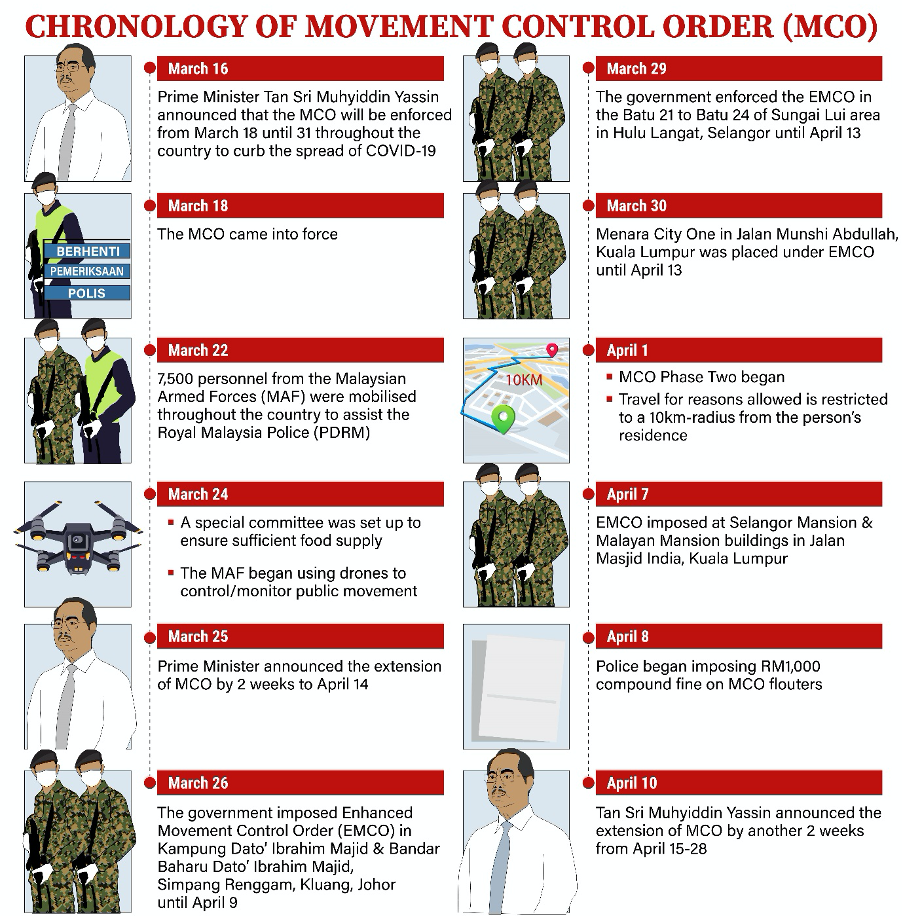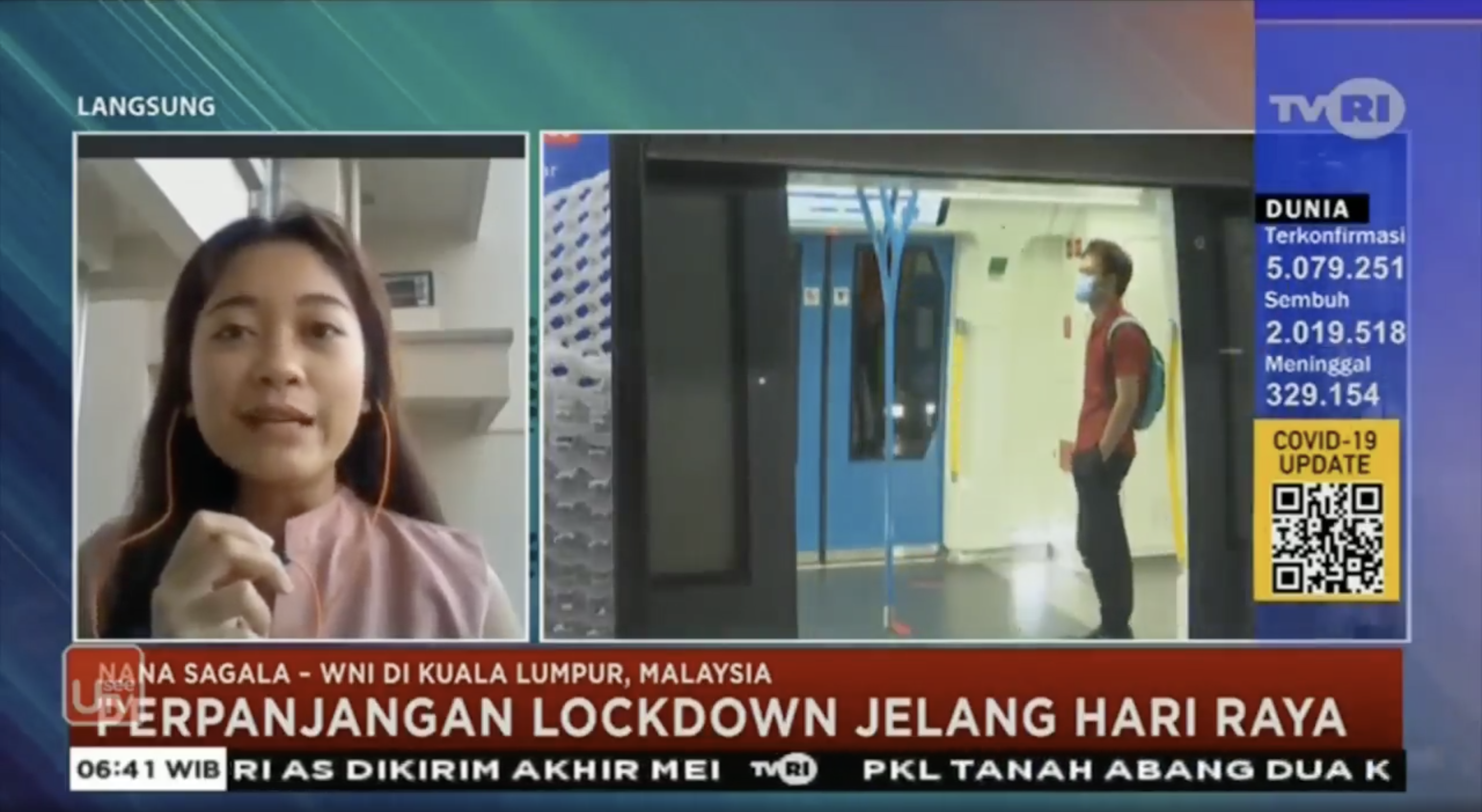
by Nana Sagala, Senior Media Relations Executive
The recent pandemic outbreak has significantly affected our lives, especially to many people who are away from their home and family. With the rising cases every day, many countries have taken drastic measures to curb the spread of the virus, including the shutdowns of both state and international borders.
In Malaysia, the government has implemented the Movement Control Order (MCO) starting March 18 until April 10, 2020.
Here’s what happened after April 10:
April 23: The Prime Minister announced further extension of MCO until May 12.
May 3: Conditional Movement Control Order (CMCO) was implemented.
May 11: The Prime Minister announced further extension of CMCO until June 9.
As time flies, it is now close to 3 months into the MCO and, later, CMCO. Before the MCO, I had planned to visit my family in Indonesia because my father was hospitalized at that moment. Unfortunately, I had no choice but to cancel my trip due to international travel restrictions. Truth be told, I was worried and couldn’t help to overthink the whole situation we were in; the wellbeing of my family, being quarantined at home, and the worsening pandemic condition in Indonesia.
Yes, my home country was in critical condition. Due to the high number of populations which are more than 250 million people, the Indonesian government was having a hard time to flatten the curve. I’m lucky enough to be in Malaysia where the government had implemented the lockdown earlier when my home country only started to do so on April 10, 2020.
Today, here I am in Kuala Lumpur—my second home. An extrovert myself, living alone at home is the toughest part of being quarantined. During MCO, people were under tight movement restriction and would only be allowed to go out for urgent necessity such as buying groceries or medication. At the same time, armies were on standby to ensure that citizens abide by the rules imposed.
Amidst self-isolation—disconnected from society and being far away from home, I was thinking of ways to spread positive messages to the people in my country. Despite the massive impact of social media during the outbreak, I for one preferred live reporting on TV channels; hence contacted my media friends in Indonesia.
As a result, I appeared in two TV interviews with Kompas TV and TV Republik Indonesia (TVRI).
Utilizing Technology to Boost Work-From-Home Productivity
Kompas TV was my first live appearance. During the interview, I’ve talked about my work-from-home experience in Malaysia from the perspective of an employee in a tech company. What inspired me to share my views on working remotely at that time was my friends from other companies across different industries in Indonesia, who have been facing difficulties in adjusting to work-from-home. Some of them even worked for more than 8 hours and sometimes, they were being contacted after working hours.
Of course, it doesn’t have to be that way. Working from home can have both pros and cons, depending on how we manage our time. I believe the key is always productivity, and to ensure that, there are a lot of tools that we can use to keep us on track. Based on my experience working from home at Forest Interactive, we’ve integrated Asana; a team and project management software with our laptops and personal computers to improve team collaboration and work management. Project managers and team members can closely monitor assigned tasks, prioritize according to deadlines, and seamlessly track the progress of each project.
On top of that, we’ve also utilized Time Doctor, an employee time tracking software to help boost productivity while working from home. The integration also comes in handy in making sure that each employee completes compulsory hours of work every day.
What’s even more interesting, Forest Interactive has also acknowledged the need to stay mentally healthy during the self-isolation period. Thanks to our Events team, we have had webinars for one hour every day, Work From Home Should Be Fun campaign, and Mobile Legends: Bang Bang (MLBB) Tournament—winners were awarded with prizes too! Some departments have also taken the initiative to keep updated with each other through daily morning team huddle. See? Working from home doesn’t have to be upsetting, does it?
No one’s saying that this pandemic is going to be easy, but together we can make it less stressful. At least not both of our shoulders are carrying different burdens. Work-life balance 🙂
Ramadan in the New Normal
My second interview was with TVRI on Semangat Pagi Indonesia, TVRI Nasional. During the interview, I’ve had the opportunity to share about my third year celebrating Ramadan in Malaysia. Usually, I’d join the breakfast or iftar with my Indonesian friends and spend one of the weekends at my cousin’s house in Negeri Sembilan. Sadly, that was not the case this year due to the COVID-19 outbreak and all plans had to be cancelled.
The difference in celebrating Ramadan this year was not only felt on my personal life, but also at work. The tradition of having iftar with Forest Family and our partners such as MDEC and PIKOM couldn’t be carried out like previous years.
The news anchors Regina Valeria Putri and Anggi asked me: “What makes this year different and what do you miss the most from home?” and to which I replied: “Of course pasar malam, iftar session with family and friends, potluck, and the never-ending open houses! We’re all coping with the new normal: celebrating Ramadan and slowly (going) back to the office.” (and I did my office shift last week!)
Adjusting and Adapting
The pandemic has definitely changed every aspect of our lives. Moving forward, I believe that we have to adjust and adapt ourselves with the new normal, and we have to this immediately. Keep on practising social distancing. Always wash your hands with soaps and water and wear mask whenever you are at the public.
Apart from that, now is the perfect time for us to leverage technology in our effort to flatten the curve. Based on my experience in Malaysia, since the reopening of economy, businesses such as restaurants and shopping malls have implemented strict SOPs such as temperature checking, personal details registration via QR code scanning, hand sanitization, and revised seating arrangement to maintain 1-metre safe distance. For some businesses, they only accept online payments such as e-wallet or debit card.
For those who are away from home or family, I believe there are many ways to stay in touch with your loved ones. Thankfully, there are many apps at your disposal such as WhatsApp, Zoom, Facetime, and many more. Most importantly, it’s not about how we connect to each other, but how we value each moment we spend with the people we care most.
Stay safe and healthy. We are in this together.


 Company Profile
Company Profile Brand Identity Guidelines
Brand Identity Guidelines